Update: New Interview with 'Canal Plus'
Canal Plus
Scoop with Raya
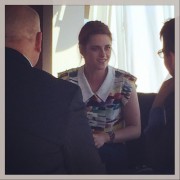



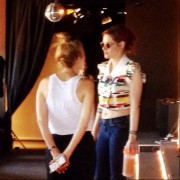


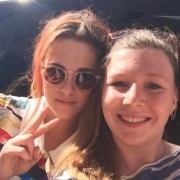
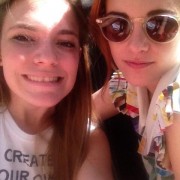
"I think the fear that motivated me here was working with Juliette. And with Olivier as well. It's just such a different setting for an American actress. It's a very European feeling film. It thinks a lot, it doesn't package its ideas and deliver them to you. I think it takes its on ride and it's really complex and what scared me was hitting it perfectly and striking this balance and this was an opportunity to really make the point hit home. I play an assistant to an actress, I comment on the sort of potential for the media to be and it's very commonly incredibly superficial. It's not 'yeah, I'm being nice right now, but basically saying this is so silly and not in an interview, not to you right now, but in a film that really means something that it's a different thing. So that was definitely satisfying to say some of those lines to her and not scary, just really satisfying."
Why Olivier thought of Kristen for the part:
"I met her, it's really via my producer Charles Gillibert, he produced 'On the Road' and so I met Kristen through him in a completely, I mean I was not thinking about this film, I had not written it so it's. But I liked her very much. I thought that was something to her that was extraordinarily powerful and I thought that movies had not used half of it. So I thought that I saw someone who had done great things but had greater things to do."
Kristen thoughts on working on location in the Alps:
"Actually I must say when we were in St. Moritz, Sils Maria, like that's where we shot it, I did start to get a little bit of cabin fever. I kind of felt like Jack Nicholson in 'The Shining' for a minute there. It was like we were all living in this old stuffy hotel and it was just like and we were so obsessed with making this movie and every second of our lives was devoted to focussing on this movie that it becomes this isolated obsessive environment but it's amazing, that's what it should be. I'm into that. I really like intense bursts of like take these three months and think about nothing but this but it definitely got a little... I mean at a certain point I was like 'OK, we need to all relax a little bit.'"
Chloe on how the internet has changed things for actors:
"I think it's weird because like for me, what's weird for me is every time I go to a meeting I get asked, 'do you, are you on social media? And if you are how many followers do you have?' and I find that really weird because instead of being asked like 'oh what movies do you want to do? what do you want to approach?' they kind of ask what is your internet social standing which I find really annoying. It's become, as a young actor it's become as a whole part of your career that if you don't instagram your movies, that if you don't tweet your movies and stuff like that, they're not going to succeed kind of thing."
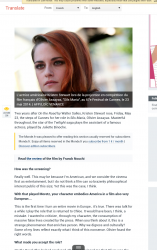
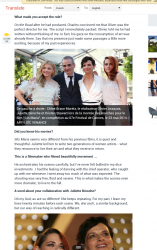
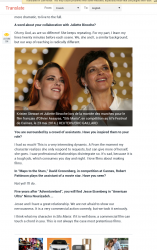
Two years after 'On The Road' by Walter Salles, Kristen Stewart walked up the stairs at Cannes, on Friday 23rd, for her role in 'Sils Maria' by Olivier Assayas. Remarkable from end to end, the star of the Twilight saga plays the assistant of a celebrity, played by Juliette Binoche.
LE MONDE: How did the screening go?
KRISTEN: Really well. It might be because I'm American, and we consider cinema mainly as an entertainment, but I didn't initially think a film that brazenly philosophical could be of interest for a public of that size; yet it seems like it was the case, I think.
LE MONDE: With the role played by Chloë Grace Moretz, your character embodies America, in a film that is yet European.
KRISTEN: It's the first time that I shoot an entire film in Europe, it's true. At one point, I was considered to play Chloë's character instead. In my opinion, it would have been a mistake... I wanted the opportunity to criticize the massive consumption of fake lives created by the media through my character. When you think about it, it's a strange phenomenon, which benefits no one intellectually. Why do we digress like this culturally? Some of my lines reflect exactly what I think of this stupidity. Olivier found the right words
LE MONDE: What made you accept the role?
KRISTEN: After Charles produced 'On The Road', he convinced me that Olivier was the perfect director for me. I was pleased by the script right away. Olivier told me he had written the script without thinking about me. In fact, his outlook on the consumption of art was already that way. Let's just say that me being there just made some moments a little bit more exciting, because of my past experiences.
LE MONDE: Were you aware of his history in the world of cinema?
KRISTEN: 'Sils Maria' seems very different compared to his previous films, to me. He's more calm and thoughtful. Juliette pushed him to write about two different generations of women artists - What they have to give up to live through their art and what they gain in return.
LE MONDE: He is a director who films movement marvellously...
KRISTEN: He stages his scenes meticulously, but I never felt like I was being undermined when I was moving. I felt like I was dancing with the head cameraman, who was catching up to me every time I was moving too far away from where I was supposed to be. Filming was really smooth, free and serene. It's what makes some scenes, even the most theatrical ones, seem so full of life.
LE MONDE: A word on your collaboration with Juliette Binoche?
KRISTEN: Oh my god, we are so different! She was always rehearsing. As for myself, I learn my lines twenty minutes before each scene. We are both similar, she and I, but our way of accomplishing things couldn't be more different.
LE MONDE: You're surrounded by a crowd of assistants. Did they inspire you for the role?
KRISTEN: I've had so many! It's a really interesting dynamic. Right when my character realizes she's only responding to requests, without being able to give more of herself, she leaves. I've seen professional relationships fall apart as well. I love films that deal with the process of film-making.
LE MONDE: In 'Maps to the Stars' by David Cronenberg also in competition at Cannes, Robert Pattinson plays the assistant of a celebrity. Have you seen the film?
KRISTEN: Not yet! But I will.
LE MONDE: Five years after 'Adventureland', you're teaming up again with Jesse Eisenberg in 'American Ultra' by Nima Nourizadeh...
KRISTEN: Jesse and I have a beautiful complicity. We're not afraid to show that we're nervous. It's an action-comedy, very commercial, but we both took it seriously.
I really believe what my character says in Sils Maria: If it's well done, a commercial film can touch every facet of you. It's not necessarily the case with pretentious films.
Olivier Assayas Talks About Kristen and Idol's Eye with Rob
Next to Juliette Binoche, who is the lead character in Sils Maria, we find a certain... Kristen Stewart! How did the Twilight star end up with Olivier Assayas and why did he choose her?
Absent from the traditional photo-call and press conference of Cannes, today, Kristen Stewart finally made an appearance on the Croisette to walk the stairs of 'Sils Maria', next to Olivier Assayas, Juliette Binoche & Chloë Grace Moretz.
We had the chance to interview the director Olivier Assayas to ask him why he had chosen the Twilight star, which we weren't really expecting of him, let's be honest! In the interview, he actually admits he was shocked she accepted his offer!
OLIVIER: When I saw her briefly, in a friendly way, I had the feeling that there was something special about her, or in any case, something different than what I knew of her in the world of cinema. And it's true that when I wrote that character, which is as old as her and from her generation etc.. I had the feeling that it was worth trying because I was convinced that there was something in her that had never been seen before, had never been caught on screen. That, herself, had not exploited in any film a complete dimension of her personnality. I was sure that if she agreed, it would bring something great to the film. And it did happen. It was way beyond my biggest expectations. There was some sort of competition of dialogue between her and Juliette that gave life to this strange duo.
My next film will be shot in the fall in Chicago. It's a genre film. A mafia and crime story. It takes place at the end of the 1960s. There will be an international cast.
ALLOCINE: And Robert Pattinson is confirmed?
OLIVIER: Yeah, yeah.
ALLOCINE: And does it have anything to do with Kristen Stewart or is it a coincidence?
OLIVIER: Oh, no. It's a total coincidence. Total coincidence. (laughing) No.. A coincidence.
THE WALL STREET JOURNAL
CANNES- France — In the opening scene of “The Clouds of Sils Maria”, presented at the end of the 67th Cannes Festival last Friday, Kristen Stewart’s character, Val, is clearly stressed-out. As the train snakes up the winding mountain route of the Swiss Alps, Val is juggling with her multiple jangling cell phones, cursing the bad connection, and trying to deal with the barrage of undesirable media, pestering directors and dramatic news that will dramatically change her entire schedule.
In the film, Stewart plays the part of a low-key bespectacled personal assistant to the glamorous Maria Enders, a fortyish famous actress, brilliantly portrayed by Juliette Binoche. It’s Val’s job to arrange every infinitesimal detail, from making sure that Maria is on time for her Chanel gown fittings to endlessly walking the actress through the lines of her script.
Highly praised for her subtle performance by the Cannes critics, Kristen Stewart says she’s glad to have had a chance to explore the other side of fame, with all the ambivalence and fascination about celebrity culture that the part required.
“The reason this movie was made was not to make a statement about how superficial media can be, but it was a lot of fun for me to be the one to say it,” says Stewart. “Obviously, I’ve had more experience with the media, so it makes it funnier.”
“I don’t a have a personal assistant right now,” the actress says, “but I have had one in the past and I definitely understand the dynamic. The difference is that I never had such a co-dependent relationship.”
Going on what Stewart has experienced “in real life”, she says, there were moments during the shoot when the actress coached her co-star, Juliette Binoche, to make her performance more believable. “When we were getting out the car to walk up the red carpet, Juliette just like opened the door and started to get out. I said, ‘what are you doing? A star would never do that!’”
At one point in film, Stewart’s character, Val, hotly defends the hell-raising young starlet Jo-Ann Ellis (Chloe Grace Moretz), who is to play opposite Maria in her upcoming new role in the theater. Contrary to Jo-Ann’s reckless tabloid-baiting bimbo image on you tube, Val tells Maria that she shouldn’t judge the straight-out-of-rehab actress so harshly.
“She doesn’t want to be swallowed up the Hollywood machine,” Val says. How has Kristen Stewart managed to dodge some of the trappings of celebrity culture?
“When I take on a role,” says Stewart, “I really like to think, and I do not care what people think about them afterwards. I really want the experience. I think a lot of actors—not good ones—are just product oriented, as is the business.”
“American movies are so packaged and delivered,” she continues. “They think for you. Like the stories in the tabloids—they’re so easily consumable. But that said, I love big American movies—they’re my foundation, what I grew up on—and I still want to do them.”
“Kristen is so powerful and has such a strong presence,” says French director Olivier Assayas. “I wrote a part in this film hoping it would be remotely interesting for her. I honestly didn’t think she would do it. I thought that the subject would be too touchy, but she liked the idea.”
Stewart says that she was thrilled to accept a role in Assayas’ film after such a long dry spell. “I didn’t make a movie for a really long time because I didn’t get offered anything that I liked. I didn’t work for two years.”
“I want to start directing,” the actress adds. “It’s still way down the line but I’m going to start dinking around and making shorts. You learn by making mistakes but that’s definitely what I want to focus on next.”
Quotes from Roundtable Interview
The actress was feeling a bit defensive following the world premiere of her latest post-"Twilight" indie, Olivier Assayas' "Clouds of Sils Maria," and you can't blame her. Ever since shooting to worldwide fame after being cast as Bella Swan in the "Twilight" franchise, it's arguable that no actress has received more attention -- often for the wrong reasons -- than Stewart.
Up until the first "Twilight" entry, Stewart had endeared herself to many with her bracing work in films such as David Fincher's "Panic Room" and Sean Penn's "Into the Wild." As soon as "Twilight" hit the scene, turning her into a supernova overnight, she became better known for her romance with co-star Robert Pattinson than her craft. She kept busy working in between the five "Twilight" installments, appearing memorably alongside the late James Gandolfini in 2010's "Welcome to the Rileys," and in 2012's "On the Road," which also premiered at Cannes. But it's been her post-"Twilight" projects that have drawn the most attention to the actress -- attention she's trying her best to manage.
First came the Sundance prison drama "Camp X-Ray," and now "Clouds of Sils Maria," in which Stewart shares the screen with Juliette Binoche, playing her character's overworked assistant. "Clouds of Sils Maria" was better received by critics, yet both were met with countless articles on how Stewart fared in the film, and whether her performance boded well for a long career ahead. (Just last week, Criticwire ran an article titled "Will Kristen Stewart Finally Get Her Due With 'Clouds of Sils Maria'?") Despite her many years the business, Stewart still finds herself having to prove that it's her talent that got her to where she is today -- not the twihards.
That struggle was evident during a roundtable interview Stewart did with select press at Cannes the afternoon following the competition screening of "Clouds." No longer visibly press-shy as she was when promoting the first few "Twilight" films, Stewart took to the roundtable with a passion that was palpable in the way she articulated her candid responses to each question. It's clear there's some fight in her. Below are the highlights:
She doesn't think of her projects as "products."
"I am obsessed with ignoring the idea that we're creating products. I really choose every single project I do based on the desire, and based on really just wanting to experience making that story happen."
She's using her celebrity as a tool.
"I just directed this music video with my friend, and it's going to be made to be something that it's not. It's something I did in four days, it was a fun little story, and it's going to get more attention than whatever it's supposed to get. I think it's just something to play on. If you can't change it, then don't be afraid of it — push harder!"
She loves blockbusters just as much as small indies — as long as they're good.
"It's so possible to make a [big] movie that is meaningful and truthful, and putting it in a sort of heightened setting, to really take ideas that mean something to us but making them more effective by putting them in an odd world. Using conventions to make things hit harder.
"I also just like really like big movies. I'm American, I grew up on them. But I also want them to be really good. I think that that's totally possible. When you're not completely product obsessed, I think it's possible."
She's doesn't get too close for comfort with her assistants like Juliette Binoche's character in the film.
"I have had an assistant. While we were making the 'Twilight' movies, I did a movie in between each of them, so I needed someone who I could ask things like, 'Can you go help me buy some toilet paper?'
"I haven't gotten as close. I have seen it though. It's something that's familiar to me. Actors become super isolated. Again, I'm not fucking complaining about it. But you have a very unique perspective on things because people don't talk to you. They feel like they can't come up and say, 'Hi.' Suddenly you're incredibly lonely. So people hire friends for these jobs, and then the lines get blurred. They're your co-worker, your employee, your associate, your friend, your mom sometimes.
"In the case of the film, what I think makes it interesting is you have these two women who are codependent and obsessed with each other in many ways. And they don't fit into the normal categories of what we all know relationships to be. Our relationship should have a category. What the movie is about is having a very unique relationship in a very esoteric world, and having a really hard time gauging why it's happening and how to deal with it. Knowing that it's unhealthy and you should be getting those things elsewhere, and how that polarizes you and how at the exact time, it brings you so fucking close together."
She got a tattoo after making "Clouds of Sils Maria."
"I got this because of this film," Stewart said after being asked about her new tattoo on her right forearm. "I gave Valentine [her character in the film] tattoos for the film, so I had transfers made. You don't know anything about Valentine, it's all about Maria [Binoche's character]. And that's a huge aspect of the story, is that she never focuses on herself. They never talk about her life, ever. I wanted to show little indications of, 'Who is that?' Instead of just playing an assistant that was generic. She has interests, she's going to places, you just don't know where they are. And so I got so attached to this one that I got it."
"This is part of 'Guernica,'" she said of the tattoo itself. "It's a Picasso painting that I saw when I was 18 and in Madrid. It fucking floored me and it's the first time I responded to a piece of art like that. It is just perfect for me. I love what it makes me think of. It's like 'keep going, and keep the fucking light on.'"
She's doesn't consider herself to be a "performance-y" actor.
"I'm just the type of actor, and there are different types, who's not all performance-y. I know a lot of actors that fucking love it. Like right now they'd be captivating you. It goes against my grain. Those things don't go together for me, which makes it hard sometimes."
She feels she was misunderstood when she rose to fame.
"I'm not saying that anyone's impression of me is wrong (that would be a silly thing to say), but initially I was deemed very ungrateful, like I didn't care. It's a thing. Think anything about me, do NOT think that I don't care. It was because I was nervous and I was freaking out that everyone was fucking staring at me."
She knows how to deal with her fame now.
"I totally have changed, just in the way that I can deal. It's not like they were right, but they weren't wrong. I don't think I was conveying myself as easily. I was just totally overwhelmed. The impression just wasn't as spot on. I'm a little older and I'm more experienced with it. It's easier to talk to you guys about it. But initially, it was just kind of impossible. When you're put on the spot and you can't think — it was a ridiculous version of that. It blew up in my face. It's hilarious that the perception is that I don't care, because when that was happening, I was like, 'Oh my god, no one cares more than me!'
She's not in it for the fame.
"With some people you wonder why they're still doing what they're doing. What is driving you at this point? The job takes a toll, a thing I think the movie is about. You're giving so much of yourself all the time. It's not something in your genetics that you retain. It can really kind of destroy you, constantly thinking about what people think about you. People who want to be movie stars… it's such bullshit. That type of life is a huge driving force in so many actor's lives. But they wont be happy people at the end, 'cause they're not doing anything for themselves. They're always satisfying."
She thinks actors are "weird."
"If you don't have anything to put in, you're not going to give a lot out," she said of her craft. "Go out and live your life and show us something that you've learned. I've worked a lot. It's not like I've taken breaks. It's not breaks that helps, it's managing input and output. Most people live their lives happily. The impulse to make stuff is not in everyone. Most people who have that impulse are weird. They need to take care of themselves."
Interview: Translation/Scans/via | DM | allocine | WallStreet | Roundtable | Raya
Pics: 1-2-3-4-5-6-7

No comments:
Post a Comment